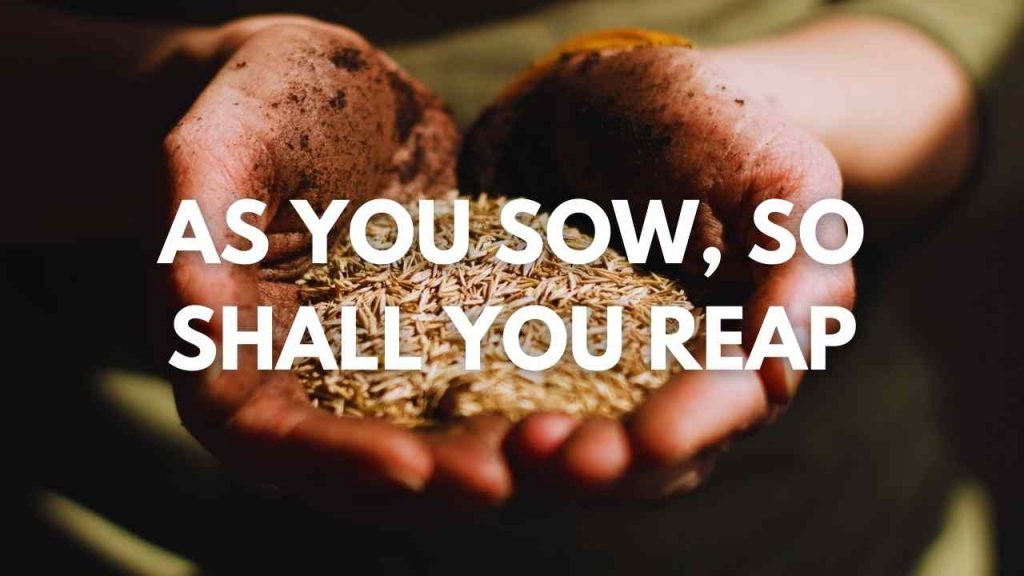In this life we have many different experiences, some pleasurable and some miserable. In this interview, Jagad Guru Siddhaswarupananda explains that it is not by chance or accident that we have these experiences.
Question: Why is it that if God loves all of us—His children—we see so many disparities and disabilities?
Jagad Guru: This question which you are asking has also been asked by many millions of people. Unfortunately, however, people have failed to receive a satisfactory answer to this question. Many so-called teachers who do not actually have the answer attempt to reply: “We can’t understand God’s dealings. It’s a test. It’s God’s will,” and so on. Because they don’t appreciate transmigration of the soul or the science of reincarnation and karma, then they cannot satisfactorily answer this question. In reality, the answer is quite simple.

If you appreciate the law of karma, “As you sow, so shall you reap”, then you can appreciate how your prosperity or non-prosperity is due to your previous activities. It is not that the Supreme Person arbitrarily chooses to make you poor and another person rich, to make your body diseased and your neighbor’s healthy, etc. It’s not the Supreme Who’s doing it but you. He has simply arranged the laws in such a way that you have possession of your own destiny. If you are suffering now because you were born with one leg, then you may have two ways of looking at it. First, you may see it as your fault. Secondly, you may consider it the fault of the Supreme Soul. Now unless you appreciate that you existed previous to this body, then you’d have to say it’s the fault of the Supreme. After all, if you think that life just began with this body then you’ll question, “Well, how come it’s like this? What possible basis could God have for doing this to me? I didn’t do anything.”
Question: I’d see it as being unfair.
Jagad Guru: Yes, that will be your conclusion if you do not appreciate that you existed previously and that whatever you are going through now is simply the result of your past activities. This means that whatever you are reaping now, you never sowed. Jesus did not say, “As you sow, someone else will reap,” or “What you’re reaping now, you never sowed. He said, “As you sow, so shall you reap.” So it’s not a question of God not being perfect, or of Him not loving you but it’s a question of your having done something which you shouldn’t have done and which you must pay for. And if you do not come to appreciate this truth that you are the one responsible for your destiny, then you’ll end up throwing the blame at the Supreme Person. Unfortunately, you may even come to a point of seeing the Supreme as a very powerful being Who has no concern and no sense of justice.
Question: So it’s dangerous for people not to understand these facts regarding karma, reincarnation, etc.?
Jagad Guru: Yes. Not only may they become bitter towards the Supreme Person but they may even become atheists who totally reject the existence of God altogether. So there must be appreciation of the reality that your situation is due to your own making. It’s your fault. You’re the one who made your present existence by your past activities. And by your present activities, you’re preparing your future existence.
Question: What is meant by “good karma” and “bad karma”?
Jagad Guru: Karma means action. Good karma means good action, and bad karma means bad action. Good and bad here are both material concepts, not transcendental.

Good karma leads to good karmic reaction; bad karma leads to bad karmic reaction. For example, if a person in this life helps others enjoy materially by doing some good, charitable acts—whether it be opening a hospital, teaching poor children, or giving away food—then this “good karma” is noted by the Lord. If, by the end of his life, a person has, say 100 “points” of good deeds, then he has 100 “points” to his credit, 100 “points” in his karmic bank account.
If a person (perhaps even the same person) engages in “bad karma”—actions that bring pain and suffering to other living entities—then this bad karma is also kept track of by the Lord. A person who does 100 “points” worth of bad deeds has 100 “points” of bad credit—a 100-point bill to pay.
After death, a person then gets a body according to his mentality and to the karmic reaction good or bad due him. If a person wants to enjoy sex, sex, sex, and more sex, God will give him a body that will afford that opportunity. But if he has “bad” karmic reaction in store, he will also, in his new body, suffer the pain that is due him.
A person with “good karmic credit” may also want sex, sex, sex. He too will receive a body suitable for such sexual pursuit. While living in that body, he will be rewarded with material pleasures exactly in accordance with what is due him. In fact, the person who has such good and such bad karma may be one and the same. A person who greatly desires sex and who has 100 points of good karmic credit, and 100 points of bad karmic credit will alternately experience pleasure and pain in the body he takes on.
So although God provides a person with a gross material body according to how that person wants to enjoy, it is the person himself who is responsible for the actions which he engages in while in that body. Being responsible for one’s actions, a person must suffer or enjoy all the reactions to his actions.

Good and bad karma refer to material pleasure and pain. All people experience a certain degree of pain. Sometimes they are happy and sometimes they are suffering. Some humans experience great pleasure on earth, but this pales in comparison to the pleasure of those who live on heavenly planets. Some humans on earth experience great suffering but this cannot compare to the suffering of those who exist on hellish planets.
But no matter whether one experiences pleasure or pain, this experience is due to past karma.
Question: Is karmic reaction limited or unlimited?
Jagad Guru: It is limited. A person who engages in good actions will receive only a limited amount of good in return, and for only a limited time—depending on how much good credit is in his karmic bank. The same goes for bad karma. A person is never cast into hell eternally, as some fanatics would have us believe.
Question: When you talk about the individual’s karma, I wonder about war refugees and other millions of people who all suffer collectively. How is their karma connected to each other? Why do they suffer all at one time?
Jagad Guru: There’s no such thing as collective karma or suffering. The suffering is only the individual’s suffering. You can’t suffer the sensual experience of another person’s suffering. In other words, I am in this body. You are in your body. I can suffer and I can enjoy but you can’t directly experience it. An individual may be suffering and yet another individual sitting right next to him might not be experiencing it at all. So suffering is an individual experience. The same goes for enjoyment.
In any case, try to understand that everyone suffers. It’s not that only some people suffer. In fact, everyone suffers. For example, someone may say, “This person is only twenty years old, and he died. It’s so unfair.” But if somebody is eighty years old and he dies, is that fair? Suffering is also there. Suffering is part of material nature. It’s built into this body.
Once when I was in the Philippines, there was this girl who was sort of torn between spiritual activity and revolutionary activity. Anyway, she seemed like a very sincere person. She was actually quite sensitive to the suffering of people, and this is to be appreciated.
She said, “Before we can really help people spiritually, we have to make it so that they’re no longer suffering.”
But as I explained it to her, this is impossible. In the material world, suffering is built in. If we take up her point, it’s like saying, “Okay, we’re going to engage in spiritual activity only after the sun no longer sets. As soon as we can keep night from falling, then we’ll engage in spiritual life. Until then we can’t practice spiritual life because every day the people suffer when the sun goes down. They can’t see any more because they become blinded by the darkness.”
But what are we going to do? Stop the sun from setting? If you want to try to stop suffering, then you may as well try to stop the sun and all the planets. But you can’t.
We’re just dealing with reality here. Suffering is built in. Now we’re not trying to imply that suffering is good. We’re not saying, “Ha, ha, ha! You got that because you deserve it.” It’s not what we’re saying. Our point is that everybody is suffering.
And what is the cause of suffering? Why are we suffering? These are questions asked by persons who are seriously interested in spiritual life. These are the questions that must be asked and not, “Why are the refugees suffering? Why are some Filipinos suffering?” The question is, “Why are all of us suffering?”
Somebody may say, “Oh, but the war refugees are suffering so much!” But people who live in New York are suffering too. Who knows who’s suffering more? Everybody’s suffering.
A person may retort, “Well, someone is not suffering if they live a very nice life and they die at the age of eighty.” But why is such a person considered not suffering? Have you ever seen someone die who has lived a very nice life and become very, very much attached to the world? Have you ever seen the suffering that such a person goes through when he leaves the body and all that he’s attached to? He’s suffering just as much as anyone else. Suffering is definitely there. Suffering is part of material nature. It’s built into this body.
The fact is that this material world is not our home. We are spirit souls and we’re eternal. We don’t belong here. It’s not that a person’s just being punished. It’s actually a method– a system of education. This world is a school that has been set up by God. To let us know what? This isn’t our home. That’s what we’re supposed to learn here. We’re supposed to go back home—back to the spiritual world, back to our Supreme Father.

Question: How? By engaging in good or pious acts like charitable practices, feeding the poor, donating to hospitals, etc.?
Jagad Guru: No. Although these things are obviously superior to sinful activities, still they are material activities. Material activities mean they are self-centered. A person engages in pious acts with the idea of enjoying the fruits of good karma. But good karma is not spiritual. Spiritual activity is centered around the Supreme Person. A person engages in spiritual activity with the simple desire to please the Supreme Soul. The best thing is to transcend material activity and come to the point of engaging in transcendental activities: the loving service of the Supreme Person.
Question: So engaging in charitable activities is not the highest goal of life and is not spiritual?
Jagad Guru: Yes. Such acts are fruitive and the doer must enjoy or suffer the results of his activities. Even if one is able to reap good karma, eventually it all has to end because it is still in the material dimension. Like a certain amount of credit or deposit in the bank, it runs out. It must also be remembered that as long as one engages in material activity and remains in the material world to reap good or bad karma, he has to suffer birth, diseases, old age and death. So the best thing is to actually transcend the material dimension, both good and bad karma, the entire material world. We must desire to go to the spiritual world itself which cannot be achieved by pious activities. It can only be achieved by unconditional love for the Supreme Person, that’s all. The goal of life is to come to the platform of being resituated in the loving service of the Supreme Soul. And only when we are tasting the nectar of loving devotion to the Supreme will we be satisfied and happy.

 Kirtan
Kirtan Meditation
Meditation